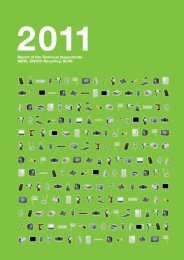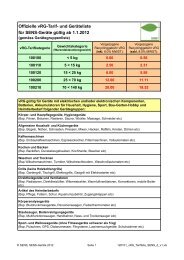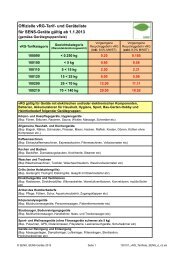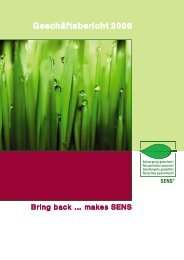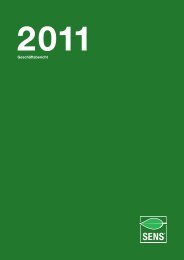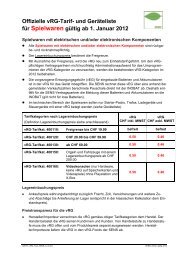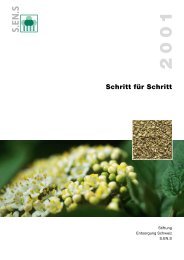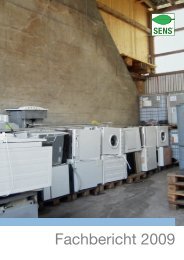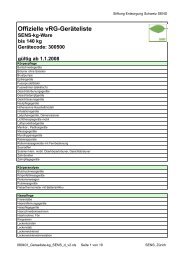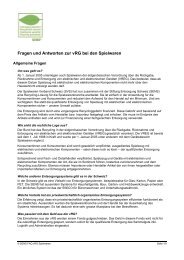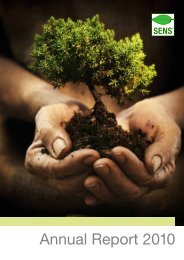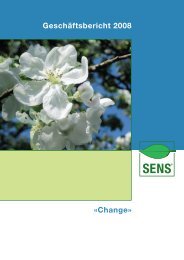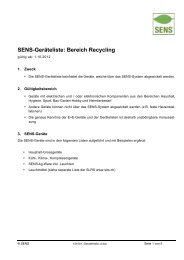Annual Report - Sens
Annual Report - Sens
Annual Report - Sens
Create successful ePaper yourself
Turn your PDF publications into a flip-book with our unique Google optimized e-Paper software.
Focus in 2012 :<br />
revision of the VREG<br />
Revision of the VREG / ORAREEA<br />
The revision of the VREG marks a major change in direction for the future of the Swiss<br />
recycling industry. To take full account of the interests of all the stakeholders and preserve<br />
the huge benefits of the present ordinance, SENS, together with SWICO and SLRS<br />
(Swiss Lighting Recycling Foundation), is taking an active role in the revision process.<br />
The Ordinance on the Return and Recycling of Electrical and<br />
Electronic Appliances (VREG / ORAREEA) requires dealers,<br />
manu facturers and importers to take back all the appliances<br />
in their product ranges free of charge, even if a customer does<br />
not purchase another appliance. The purchase price of all VREG<br />
appliances includes an advance recycling fee (ARF), based on<br />
voluntary solutions on the part of the industry. Consumers for<br />
their part are obliged to return appliances that have reached<br />
the end of their useful life and are not allowed to dispose of<br />
them as household waste or bulky items. Collecting, recycling<br />
and disposing of electrical and electronic appliances has hitherto<br />
been financed by the private sector: SENS and SWICO<br />
operate the recycling system.<br />
Why the revision?<br />
At the end of 2010 the Federal Office for the Environment<br />
decided to revise the VREG, which has been in existence since<br />
1998. The main reason prompting this decision was what is<br />
refer red to as the problem of people ‘jumping on the bandwagon’:<br />
since paying the ARF on electrical and electronic<br />
appliances is not a legal requirement, companies can take<br />
advan tage of the recycling and waste disposal network provi<br />
ded by the voluntary systems, without sharing the costs.<br />
Another reason for the revi sion lies in the recently completed<br />
revision of the relevant EC Directive (WEEE Directive). The<br />
Federal Office for the Envir onment aims to introduce the revised<br />
ordinance in 2013.<br />
To enable all those involved to take an active part in the revision<br />
process, the Federal Office for the Environment created<br />
a VREG monitoring group that represents all the groups of<br />
stakeholders: take-back and recycling systems, recycling companies,<br />
cantonal authorities, and associations. The moni toring<br />
group’s first task was to develop and discuss three possible<br />
ways of implementing the revision: introducing a general obligation<br />
like the one for battery recycling; retaining the voluntary<br />
collection, recycling and waste disposal orga nised by the private<br />
sector; introducing an obligation to pay the ARF, from<br />
which those companies affiliated to a private take-back and<br />
recycling system are exempt. Following detailed discussions,<br />
the monitoring group took the decision to pursue the last<br />
option further.<br />
Strengthening the tried and tested approach<br />
The introduction of an obligation to pay the ARF, from which<br />
those companies affiliated to private take-back and recycling<br />
systems are exempt, is intended to prevent the successful,<br />
established procedure financed by the private sector, which<br />
other countries consider exemplary, from being undermined by<br />
an uncooperative minority. At the technical level the focus is<br />
on bringing the Swiss solution (regarding relevant products,<br />
collection groups, etc.) into line with the European directives<br />
as far as possible.<br />
The Federal Office for the Environment and the monitoring<br />
group are continuing to concentrate their efforts on revising<br />
the VREG, which will provide a future-oriented, sustainable<br />
solution for the Swiss recycling industry. As a leading takeback<br />
and recycling system, SENS will carry on doing all it can<br />
to continue the success story of recent decades and further<br />
strengthen Switzerland’s pioneering role in recycling.<br />
VREG revision in brief<br />
The Ordinance on the Return and Recycling of Electrical and<br />
Electronic Appliances (VREG / ORAREEA) has been in force since 1998.<br />
It aims to ensure that electric and electronic appliances are recycled<br />
in an environmentally friendly way. The VREG is being revised in order<br />
to help solve the problem of people ‘jumping on the bandwagon’,<br />
which is encouraged by the hitherto voluntary system of finance by the<br />
private sector, and ensure greater coherence and harmony between<br />
this and the European WEEE regulations that now apply. The main aim<br />
of the revision is to introduce an obligation to pay the ARF, from<br />
which those companies affiliated to a private take-back and recycling<br />
system are exempt.<br />
SENS <strong>Annual</strong> <strong>Report</strong> 2011 7



